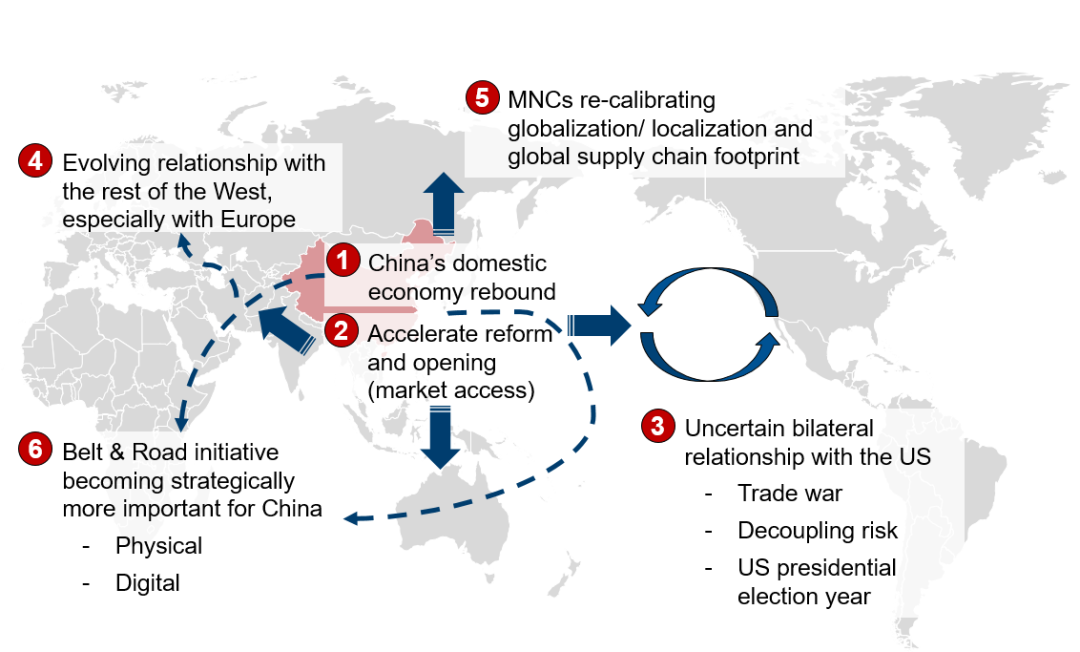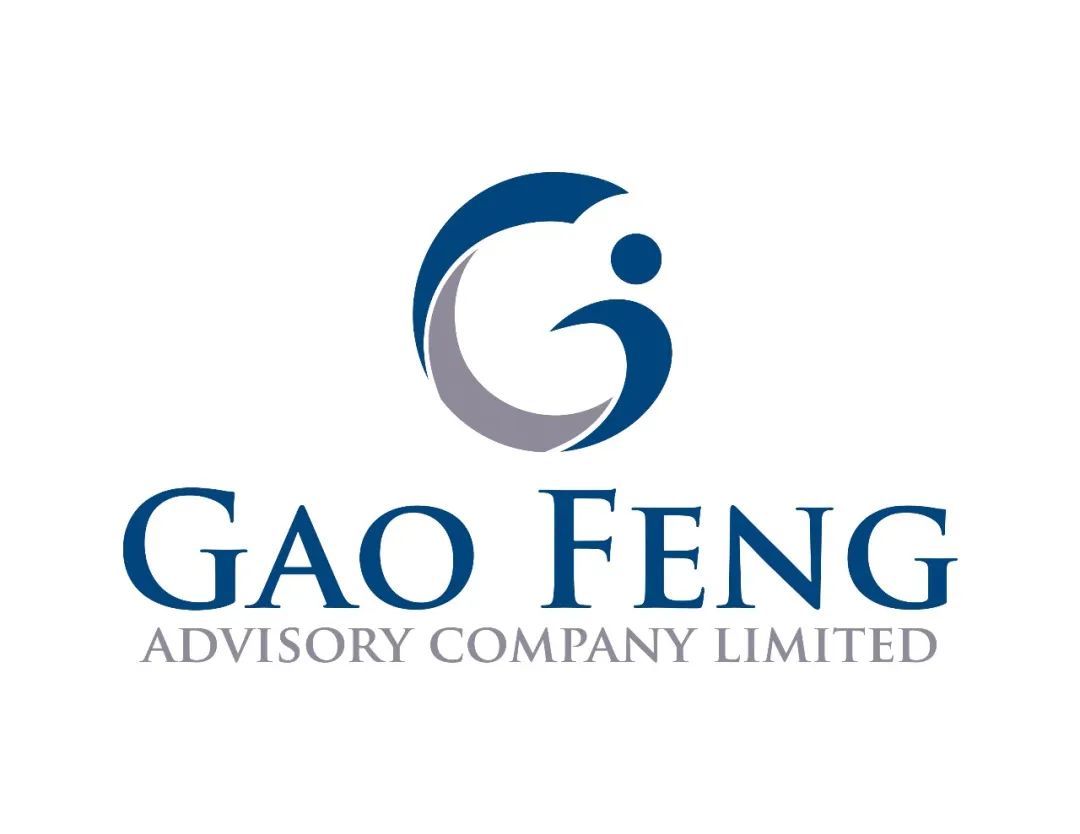GF Viewpoint | China's Business Relationships Post-Pandemic
The Business Relationship between China and the Rest of World Post COVID-19 Pandemic
By Edward Tse
May, 2020

Source: Google
Preface
On May 20th, Gao Feng Advisory’s CEO Dr. Edward Tse made a presentation over the webinar to the senior leadership team of a major European manufacturing company with operations in China on China’s Relationship with the Rest of the World in the Post-Pandemic Era.
Of course, his speech took place before China’s “Two Sessions” meetings and the recent riots and protests in the U.S.
The following is a record of what Dr. Tse narrated during the webinar.
The Business Relationship between China and the Rest of World Post COVID-19 Pandemic
What would become of the relationship between China and the rest of the world after the pandemic? By definition, this is a pretty complicated and multi-dimensional problem. Given the time limit, I will show one slide to help us focus on the most important elements (Exhibit 1). So, this is a very condensed version of my thoughts and views on this topic.
Exhibit 1
Post-Pandemic “China and the World” Dynamics

Source: Gao Feng Analysis
First of all, let’s start with China’s domestic issues -- the domestic economy and the rebound. The previous speakers had eloquently talked about these issues; in general, I am very much aligned with what was said. I just wanted to add a couple of points.
The first one is regarding the investments. That has been an important part of how China has been promoting its economic growth over the last several decades. Post the pandemic, investments will continue to be a major lever as the market continues to develop. However, the form of these investments will probably evolve somewhat this time. In the past several decades, investments were mostly in the form of physical infrastructure such as the building of bridges, railways, highways, tunnels and so on. This kind of physical infrastructure will still be built, but what the Chinese government has already strongly signaled is that the next year of infrastructure is going to be mostly in what they call “New Infrastructure”, or in other words, the digital infrastructure. As of now, the government has already earmarked roughly a trillion yuan for this program; and this is only the beginning. I would expect during the upcoming National People's Congress, we are going to see a major announcement along these lines due to its importance as an economic lever to rejuvenate the economy, but equally and probably more importantly, as a response to the pandemic. While the pandemic has been unfortunate, it has also revealed some of the shortcomings of the infrastructure that China has built over the years. Whereas many in the West have criticized China as being a surveillance economy, the reality is that the night before the lockdown was announced in Wuhan, according to the then mayor of Wuhan, several million people actually left the city; and the Chinese government didn’t know how to track where their whereabouts were. This was quite alarming for the Chinese government; and now they recognize that in order to really upgrade their capability to provide a better public health environment for their people, a total upgrade of China’s smart cities is necessary. And this will go hand-in-hand with the smart infrastructure that I previously mentioned. This will be a major move made by the Chinese government and will stimulate the economy very quickly.
The second lever is consumption which our previous speaker has touched upon already. There is also another lever which is very important and will also play a major role in the rejuvenation of the Chinese economy. It is the Chinese ability to innovate and leverage technologies, apply the technologies in to commercial applications and develop new and ingenious business models. Some of the largest internet or tech companies in the world by valuation today are Chinese. These companies epitomize the ability to innovate and to be entrepreneurs. I expect these drivers will continue playing a very important part in the regeneration of the Chinese domestic economy.
My second point relates to the Sino-US relations, which at the surface have been pretty tumultuous and is driving a lot of unusual behavior. However, the trade war was also a stimulus for the Chinese government to accelerate its reform and opening, in particular from a foreign company’s standpoint, the acceleration of market access to the Chinese economy. In the last 6 to 9 months or so, the Chinese government has announced major movements or liberalization policies with respect to foreign companies’ participation in the Chinese market. For example, in the auto industry, there is no longer a need for joint ventures. Someone like Tesla can come into China to form wholly-owned operations with lots of support from the local government and several state-owned banks. Chemicals and energy companies in the past were not allowed to establish wholly-owned operations in the certain parts of the value chain. Today they can. Actually, a number of major foreign oil companies have now established or started to establish wholly-owned operations in China. These have required investments exceeding 10 billion US dollars each. In financial services, areas such as commercial banking, investment banking, asset management and securities, have opened up to foreign companies. This is music to the ears of the big American and European bulge bracket players. The acceleration of reform and opening up is happening in many areas.
My third point is on the unusual and frankly, somewhat frightening relationship with the US. I probably don't need to elaborate on this too much as you all know it very well. The trade war which was initiated by US President Donald Trump is an issue; and of course there is now a lot of blame being directed to China. Additionally, this year is a US presidential election year, so one would expect even more unusual behavior coming out from the US. As a result, the bilateral relationship between the US and China is obviously very unstable and quite worrisome. But it is what it is. I think the Chinese government recognizes that and takes it as something that they have to deal with. I'm not sure if they have a solution, but of course this is still a major relationship to maintain.
Against the context of the relationship with the US, China also has a view for the rest of the world, in particular, the relationship with the rest of the West. Of course, Europe plays a big part in this. The Chinese look at Europe with a somewhat more than a binary perspective. In other words, there's not a single view on how to think about Europe. First of all, the UK is now going through Brexit and the European Union does not necessarily mean unity. From the Chinese standpoint, it's always a little bit difficult to grasp that. The Chinese sometimes see Europe as going along with the US, which adds on to the complexity. But, in many cases, the European leaders actually don't go along with Donald Trump. Therefore, from a Chinese perspective, they feel that there's a strategic role that Europe can play to help or to work with China in order to advance China’s global agenda. I personally and genuinely believe that the priority of Xi Jinping, is not only to help China become stronger, but also to towards a global agenda in his own benign way.
Europe is important to China. China thinks very carefully about how to work with the European countries and this will be different for every country. Countries such as Italy and Croatia are seemingly wanting to get closer to China. Some other countries like Denmark seems to be moving away. China has lots of admiration for countries like Germany and Switzerland who have deep, world-class capabilities in engineering and technology. But anyway, this is an interesting dynamic that's going on between the bilateral relationship with the US and the evolving relationship with the rest of the West.
The next area to highlight is how this affects multinational corporations (MNCs). During the pandemic, I talked to a lot of my clients. First of all, most of them were focusing on the short-term operational and cash flow issues. They were also aware of the broader issues like strategy and supply chains. But almost nobody really had the time to think through these issues thoroughly. Now as the pandemic is a little bit more stabilized in China, more and more companies are beginning to think about these issues. On the supply chain issues, there have been a lot of talks about supply chains moving out of China. There have also been a lot of talks about the “end of globalization” which I think is the headline story or cover page story for leading media this week. Last week on the Economist, they called this “End of Globalization,” which was quite alarming actually. Let’s take a more careful look at this issue. Broadly speaking, one can divide China's supply chain into three types.
One is the low-labor cost manufacturing that produces relatively simple products, such as toys, apparel, and shoes. That of course got started in China about 30 years ago. But even about 10-15 years ago, this type of supply chain has already been moving out of China because China’s labor cost was going up. Rapidly, China had begun to be not as cost competitive as compared to countries like Vietnam, Cambodia and Bangladesh. It's not new news; and the moving out is still going on and will continue to go on. In fact, over 10 years ago, I started helping some Taiwanese sporting shoes contract manufacturers who manufactured for companies such as Nike, Adidas and Converse. They had factories in Guangdong and they were already relocating the factories to Vietnam.
The second type of supply chain is the one that the destination market is the US or mostly the US. With the trade war causing tariffs increases, many companies’ decision makers felt that they could not afford to continue staying in China. They had to move their operations to other countries where the tariffs are lower and where there are more affordable economics. Some companies moved their production from Southern China to places like Malaysia where tariffs for the US export are more reasonable. But that's because of tariffs, a comparatively artificial situation. One day when the trade war ends and Donald Trump says “okay, no more tariffs”, I think many of these companies would want to go back to China because of the conditions that China presents.
The third one is probably the most important one. It is what I called “sophisticated” manufacturing. This is the type of manufacturing that is surrounded by clusters of suppliers which has been built over the years and requires an intricate set of suppliers with a lot of capabilities in components and parts. That also requires the manufacturers to have integrated capabilities to assimilate or integrate the supply components and to use the factory for the testing, prototyping and packaging. The Chinese have built this up over the last several decades in various locations, often with help from local governments. This applies to sectors like smartphones, tablets, and increasingly IoT (internet-of-things) products or AIoT products (Artificial Intelligence plus IoT products).
This type of supply chain is pretty sticky actually. Would some of this kind of supply chains leave China? Maybe. Would they leave China in droves? Unlikely. The stickiness is strong because of the capabilities and the clusters that Chinese manufacturers have formed. By the way, when I say Chinese manufacturers, I refer to companies including Foxconn. They are Taiwanese, but they are rooted in mainland China. While Foxconn can build a new plant in India for Apple because Apple would want to target the Indian market with some specific products, that doesn't mean that it's going to replace the existing capacity in China. They are two different things. In fact, Foxconn had tried that in India and also tried to build a plant in Wisconsin. Both have not been very successful.
Anyway, that's my view. In the future, there will be some degree of “reshoring”. There will also be some degree of localization and regionalization. But that won't be the mainstream trend at least not for the “sophisticated manufacturing” type we mentioned above. The mainstream trend is going to be globalization, however the form and shape of globalization is going to evolve.
Due to the development in technology, in particular cloud computing, robotics and automation, and the development of software. Increasingly, manufacturing can be done on a distributed manner. You won't need to have everything physically within one area. Manufacturing can take place in multiple locations. But this is not to replace China. It is a way for some companies to begin to leverage technologies to create risk mitigation measures. Managing risks versus taking a supply chain out of China are two different things. Globalization and the supply chain of sophisticated products will remain largely in China or centered around China. But at the fringes there will be new developments.
The last point I'd like to make is the one beyond the borders of China - the Belt and Road Initiative that is spearheaded by President Xi Jinping. This is very important, even though it is not as visible as it was a couple of years ago. It is also another way for the Chinese to try to break out from what they view as a threat from the US. So, I expect the Belt and Road Initiative to re-energize, but the form and shape, or the way that the Belt and Road Initiative will manifest could be quite different. Whereas in the past it was mostly around physical infrastructure, such as ports, bridges, and so on, increasingly the Chinese are now talking about building the “Digital Silk Road”, leveraging China's unique ability in digital e-commerce. To this end, entrepreneurial companies like Alibaba, ByteDance and other companies who are pioneering the expansion out of China will play important roles here.
Thank you for your attention.
About the Author
Dr. Edward Tse is founder and CEO, Gao Feng Advisory Company, a founding Governor of Hong Kong Institution for International Finance and Adjunct Professor, School of Business Administration, Chinese University of Hong Kong. One of the pioneers in China’s management consulting industry, he built and ran the Greater China operations of two leading international management consulting firms (BCG and Booz) for a period of 20 years. He has consulted to hundreds of companies, investors, start-ups, and public-sector organizations (both headquartered in and outside of China) on all critical aspects of business in China and China for the world. He also consulted to a number of Chinese local governments on strategies, state-owned enterprise reform and Chinese companies going overseas, as well as to the World Bank and the Asian Development Bank. He is the author of several hundred articles and four books including both award-winning The China Strategy (2010) and China’s Disruptors (2015) (Chinese version «创业家精神»). He holds a SM and s SB in Civil Engineering from the Massachusetts Institute of Technology, as well as a PhD and an MBA from University of California, Berkeley


Gao Feng Advisory
Gao Feng Advisory Company is a professional strategy and management consulting firm with roots in China coupled with global vision, capabilities, and a broad resources network
Wechat Official Account:Gaofengadv
Shanghai Office
Tel: +86 021-63339611
Fax: +86 021-63267808
Hong Kong Office
Tel: +852 39598856
Fax: +852 25883499
Beijing Office
Tel: +86 010-84418422
Fax: +86 010-84418423
E-Mail: info@gaofengadv.com
Website: www.gaofengadv.com
Weibo: 高风咨询公司
